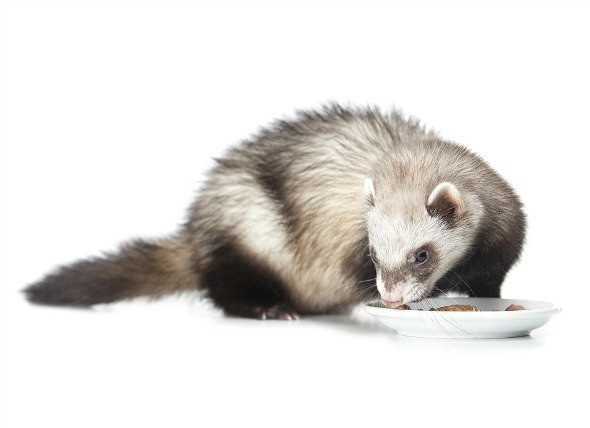What Do Ferrets Eat? A Guide to Feeding Your Ferret
Ferret Nutrition 101
If you have just gotten a ferret, or are thinking of getting a ferret, it’s a really good idea to do a little research into the best nutritional diet for your new little pal. PetMD is here to help you on your way.
When and What Do Ferrets Eat?
To begin, ferrets have a high metabolic rate, so they will eat around 8 to 10 small meals daily. And being strict carnivores, like cats, they need a high protein food source. Food pellets are an excellent source of protein for ferrets, which can be found at your veterinarian's office or the local pet store.
You will need to read the ingredient list on the packet to make sure that the pellets are made of the most nutritious ingredients. As lists go, the ingredients are listed in order from highest to lowest quantity. As such, chicken or lamb should always be the first ingredient listed for a good ferret food. Additionally, avoid foods that include grain or corn.
Can Ferrets Eat Cat Food?
If you are not able to find a prepackaged ferret food in your area, don’t panic. Kitten food works as well (again, check the ingredients list), as long as you give your ferret fatty acid supplements, which are available from a pet store. Kitten food has a higher protein content than adult cat food and is therefore more suitable.
What Other Foods Can I Give My Ferret?
Homemade food is another way to feed your ferret. You can feed your ferret cooked or raw chicken along with the pellets. Chicken baby food is acceptable as a supplement to the pellet diet, too. Remember that the dry food is an important staple, as it helps to keep their teeth clean.
What Foods Can't My Ferret Eat?
Avoid foods that are high in complex carbohydrates, such as fruits, vegetables, dairy, or anything containing sugar. Because ferets are strict carnivores, their digestive tracts cannot process these types of food
Variety is the Key
Like cats, ferrets can be fussy creatures, preferring only one type of food, so it's a good idea to vary it up (just in case a brand either changes its ingredient makeup or goes out of business). If you do have a fussy ferret, you might try slowly mixing small amounts of the new food in with the old, until you transition over completely to the new food. This may take about two weeks.
If you choose to feed your ferret pellets, choose the shape of the pellets carefully. Triangles or anything with sharp corners can jab the roof of your ferret’s mouth, so smooth, small chunks and oval shapes are the best.
Watch Out For the Hairballs
Ferrets also get hairballs from self-grooming, but they don’t regurgitate them like cats do. To combat the problem, manufacturers have designed treats to prevent hairballs from developing. Supplement these treats into your ferret's diet and weekly routine.
If your ferret does have hairballs that have become lodged, you may need to take it in to a veterinarian to have it surgically removed. The ability to prevent any hairball-related complications far outweigh the costs of this cure.
Smart (and Healthy) Treats
Speaking of treats, ferrets love them! Good treats for ferrets include cooked egg, cat treats, and bits of chicken, turkey, or lamb. Meanwhile, you should avoid giving your ferret any grains, vegetables, ice cream, or chocolate. It's best to stick with treats that are specifically made for ferrets or, second best, treats that are made for cats—but never dog treats.
Here's a tip: Ask your neighborhood butcher for cast-off pieces of fresh meat, like the organs and other bits that people don't like but that ferrets do. To avoid any potential for illness caused by raw meat, cook the meats before you feed them to your ferret. One way to make treat time easy is to cook up a batch of meat and cut it into small chunks that can be frozen for convenience—a minute or so in the microwave on thaw setting and happy times are here!
This is just the beginning of getting to know your furry new friend. Now that you know what to feed your ferret, when to feed it, and what not to feed it, you can start having some fun bonding.

Hi! I am a robot. I just upvoted you! I found similar content that readers might be interested in:
http://www.petmd.com/ferret/nutrition/evr_ft_nutrition_ferret
Here in The Netherlands a lot of ferret owners are giving them dead mice, rats or hamsters. The ferret eats them with hear and bones. It's actually better for their stomage, because lots of the so called ferret foods are not that great in quality (actually I don't know a single one that is of a really high quality). There are some kitten foods that are okay. Also, here we don't feed any chicken to our ferrets, especially not raw, because of the salmonella risk, which can kill your ferret.